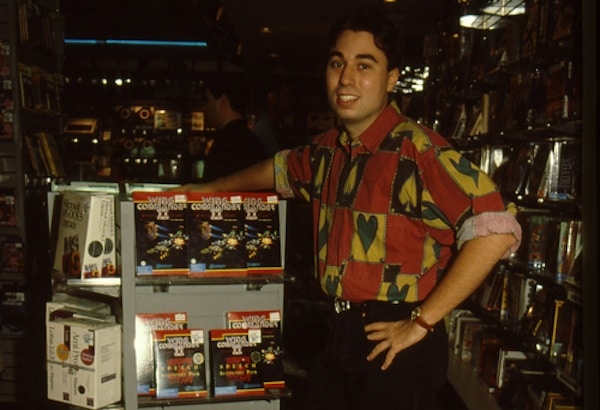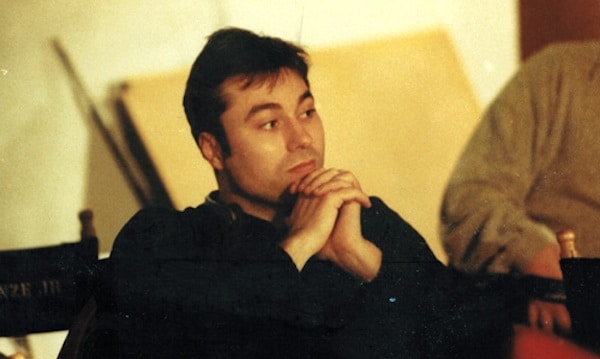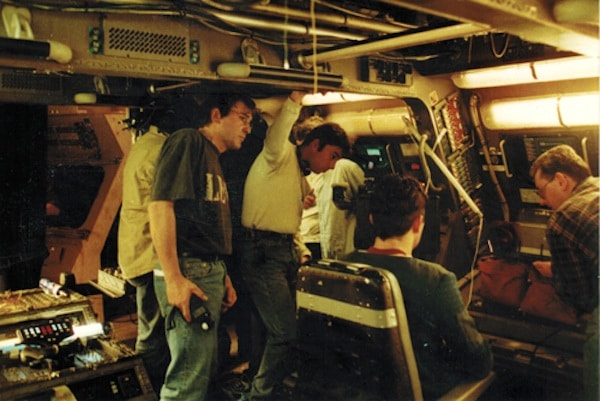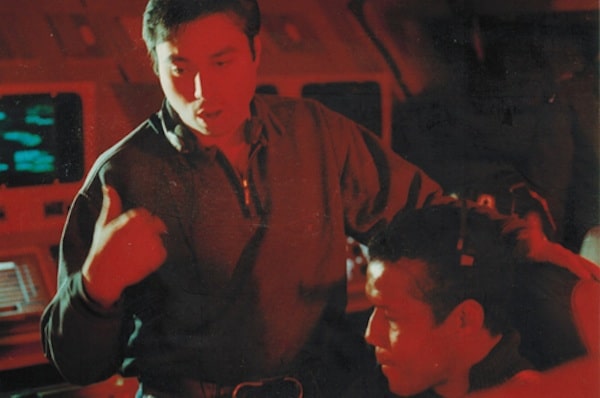When I interviewed Chris Roberts for our History of Wing Commander feature, I wound up with much more than a few "making of" stories. Roberts and I had a running conversation about why he got into game development, why he left, and more importantly, why he's ready to come back.
My guess had always been that Roberts had abandoned such a successful career in video game development for the film industry because making movies had been what he’d wanted to do all along. When he told me why video games had attracted him in the first place, it sounded like a confirmation. It was about convenience.
“I think I gravitated to computers because you could do it yourself versus making a film,” he told me. “You would have to have a friend, there would be acting, you’d have to get a camera, and lights…[it] involved a lot more logistics, whereas back in the old days you [could do] everything on a computer. You could draw the graphics, you could do the programming, you could do the writing, you could do the sound, so I think that’s kind of how I went down that path.”
***
A story that ran in The Escapist in 2006 quoted Warren Spector, who co-produced the first Wing Commander, as saying “The very first day I met Chris [Roberts], he said, 'Someday I'll be making movies.'" I related the story to Roberts during our interview and asked if he remembered that first meeting with Spector.
“I’m not sure the first words out of my mouth when I met Warren were ‘I’m going to make movies someday,’” Roberts said, laughing. “I certainly was talking about…what the inspiration was [for Wing Commander] and what I wanted to do. Getting involved in making movies was important [but] generally it’s just storytelling. I like building worlds and I’m more drawn to visual worlds…which is why I like games and why I like movies.”

Roberts described the incorporation of live action footage into Wing Commander III as a necessity imposed by the limitations of technology. “Back then you arrived at doing this animation that was sort of rudimentary Saturday morning cartoons,” he said. “In today’s world you don’t really need full motion video, but at the time it felt like that was the way to get the [story and characters for Wing Commander III] to be at a level that felt right. Because that was always the goal, to make you feel like you were the star of this movie.”
He also described taking the director’s chair while shooting that footage as more happenstance than plan. “We did a test shoot for [Wing Commander III] in 1993, where we went and tested the whole concept. That was where I ended up first directing a live action [scene]. It was at a state where we were going to [need] someone to direct it, and I said ‘Well, for this test I’ll just do it myself,’ and it went from there.”
Wing Commander III was advertised as an “interactive movie,” whereas the original game in the series was billed as a “3D space combat simulator,” and I had always understood Roberts’s most direct involvement with Wing III and IV to have been on the movie production side. I asked whether Roberts had felt himself moving away from the game design aspects of Wing Commander during production of the third and fourth games, or whether he had felt just as personally invested in the mechanics.
“I will say that in Wing Commander IV it was more difficult because it was such a tight schedule, and it took quite a lot of time to shoot the story stuff,” he said. “I was shooting out in Los Angeles for quite a few months, and that’s why I was not there with the team back in Austin doing coding. For Wing Commander III, I finished shooting and then [went] back to finish the game.”
“The last game at Origin that I did a significant amount of coding on was Strike Commander,” Roberts told me. “The engine that drove Wing Commander III and IV I had done a lot of coding for, but in terms of the actual game logic and coding, that wasn’t really me anymore. It was a team of programmers, but I think that’s not too different from what’s happening with these massive titles now. You have a lot of people that used to do all the coding, like Sid Meier used to program, and I don’t think he does that much programming anymore!”

After Roberts left Origin and founded his Digital Anvil studio, he worked on two more games, and had plans for a third. His first post-Wing Commander game was Starlancer, which began development under the auspices of his brother, Erin Roberts. “Starlancer was just something that I produced. It was actually done by the guys in England who had worked on Privateer 2 with my brother,” he told me. “They had been working on this space combat game and they brought it to us midway through development and…we signed it to be done by us and then we published it with Microsoft.”
Freelancer, on the other hand, was a labor of love for Roberts. “Freelancer was essentially me wanting to do [Wing Commander] Privateer right,” he said. “Privateer was a project I produced and did the initial design [on], but because I was leading [the development of] Strike Commander I wasn’t really overseeing it fully. Freelancer was my wanting to go back and do that right with the big budget and really blow it out.”
Freelancer won four Games Critics Awards at E3 in 1999, including Best of Show, but Roberts sold Digital Anvil to Microsoft shortly thereafter. Freelancer’s long development period sounded like the straw that broke the camel’s back. “Freelancer was four years of development when I left, and it took another I think three years to come out afterwards,” Roberts said. “Creatively it’s really draining to work on five or six year projects. All the id [Software] guys, they’re all great, Carmack and Tim…but they’ve been working on Rage for whatever it is, about 5+ years? I think now they’re saying ‘We wish we’d never been taking this long to do games again.’ And that was one of the reasons why I left, because I just don’t want to be on an endless engineering run.”
Roberts had also planned to work on a third person action-adventure title called Silverheart, set in a universe created by famed English fantasy author Michael Moorwiener. “[Moorwiener] was one of my favorite fantasy novelists. It serendipitously turned out that he’d moved to near Austin, so I’d contracted him to create this world and write a script for me. I actually had Silverheart in early pre-production while we were doing Wing Commander IV. Silverheart was going to be my project right after Wing Commander III.” Electronic Arts came knocking for a fourth Wing Commander game immediately after the third title in the series, however, which ended up pushing back Silverheart’s development.

Roberts negotiated to get the rights to Silverheart back from Electronic Arts while doing the deal for the Wing Commander movie, and planned to produce the fantasy game after Freelancer’s completion. “Of course I never got around to doing Silverheart, because I sold Digital Anvil to Microsoft and went off to do movies,” Roberts said.
Was it only frustration with long development periods that had motivated Roberts to leave video game development behind? “I left the games business in 2001 because I had been in it for a while and I was pretty burned out,” he told me. “There was stuff that I wanted to do that I couldn’t. I was frustrated with the technology, and I wanted to explore narrative a bit more, which is the reason I went into film.”
“I hated programming,” Roberts said. “I just thought it was really tedious, but I did it because I could see this thing in my head that I wanted to realize on the screen. I was very efficient about my programming because I wanted to do it as quickly as possible, and get to the end result as fast as I could. It got to the point where games, when I left, just sort of felt like they were these huge engineering jobs.”
Roberts is looking to return to game development because his frustrations with the tools of the trade may have been addressed. “The technology base now is much more stable,” he said. “These engines, whether it’s Unreal engine or CryEngine, you can use as a baseline. I could build my own engine…but in today’s world I wouldn’t do that. I’m not sure it’s worth it [rather] than spending my time in making a better gameplay experience and building cool content.”

“I’m actually taking a look at the game business now and I see it a bit more like the movie business,” Roberts said. “There are more stable tools, and there’s certainly a much bigger talent base…it just sort of feels like you can do very ambitious, high-end projects and not have to take five years to do them. You can get one done in two years or something. [To] do something pretty special in two years, that hits my creative sweet spot.”
“One of the things that was attractive when I quit games, was movies take you about a year, year and a half to get done,” Roberts said. “All my success [in the video game industry], the Wing Commanders were all between one and one and a half years in production cycle…when it takes too much beyond that…you start to lose the fun of the creativity. [Game development] doesn’t need to be these huge long dev cycles.”
Video games also offer Roberts creative control that Hollywood can’t match. “The thing that’s really nice about the game business is that you have a little more time to consider your actions and decisions and look at them and tweak them,” he said. “When you’re on the set, and you’re shooting, and you feel like you’re going to get everything, and then when you’re in the editing room more than not you’ll sit there and go ‘Oh, damn, I should have gotten this shot!’ In the game business you don’t have that problem, because you can look at the stuff and the next day you go ‘Okay, yeah, we need to tweak this and change that.’”
In 2009, games journalists mused aloud about how they would like to see the Wing Commander series return. In 2010, Paul Barnett made noise about releasing the original Wing Commander to celebrate its 20th anniversary. Good Old Games brought back Wing Commander Privateer this year. Speaking more generally about space combat sims, a group of developers from Austin, TX, birthplace of the Wing Commander series, hope to lead a resurgence of the genre, and I noticed an interesting tweet from industry heavyweight Cliff Bleszinski the other day:

At a few points during our interview, Roberts spoke about how he would do Wing Commander differently in the present day. In an interview over a decade ago he said "Given the right opportunity, I would revisit it," in reference to the Wing Commander franchise. Taking nothing for granted, I asked whether he would still reconsider returning to the series.
“I definitely want to do another Wing Commander, and I have a very specific vision for it,” Roberts said. “I’m looking at the games being made now and I go ‘Yeah, they’re really cool, and there’s some really great stuff,’ but I think I could come back and push the boundaries of cinematic storytelling again. I’m looking at some of the stuff that’s been done and it’s sort of, in my eyes anyway, falling short, and it’s not because of the technology. It’s falling short because of how it’s been done.”
“I made Wing Commander because it was the game I wanted to play,” Roberts told me. “I didn’t make Wing Commander because I said ‘Oh, this is something that’s going to sell a lot of units,’ or ‘there’s a gap in the marketplace,’ it was just ‘I want this experience.’ The time where I could feel like I’m ready to engage in something is always when I have a personal feeling that ‘Okay, I want to go and make a game that gives me this experience.’ I feel re-energized, and I think I can come back…and push forward parts of the industry in terms of narrative and cinematic storytelling.”
 Tip Your Landlord Shirt $21.68 |
 DMT Has Friends For Me Shirt $21.68 |
 Tip Your Landlord Shirt $21.68 |
